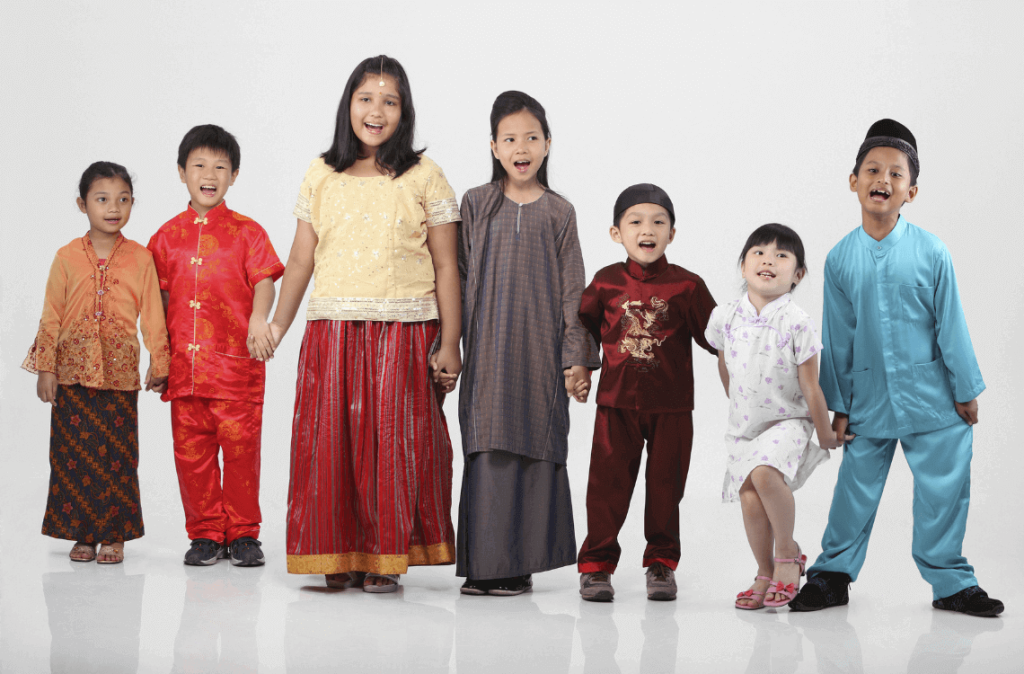Living in a multi-ethnic country like Malaysia means the communities around us are made up of people from various backgrounds and cultures.
Your next-door neighbour could be of a different race and religion than you. Your co-workers may include people from other countries who are unfamiliar with the local customs.
The same can be said for who your kids meet and mingle with at school or on the playground. They may even have best friends of a different ethnicity.
And these are all wonderful opportunities for you and your children to learn about and appreciate all the similarities and differences. This includes everything from their beliefs to their cultures and festivities.
Festivities are one way in which religions and cultures around the world express themselves. Some celebrations tell histories and remember past events; while others commemorate yearly occurrences of important figures or important events for practitioners.
We are fortunate in this country to be able to participate in all of the various festivities that have even been designated as public holidays.
That said, teaching children to respect and appreciate the various festivities is important.
By doing so, they will gain a better understanding of the universal human values shared by all cultures and religions, while also respecting the differences and uniqueness of each culture.
Why Children Should Respect All Festivities
Respect is an important virtue for a child to possess. A child should learn about respect from an early age, whether it is respecting an individual or respecting a group of people as a whole.
Respecting different cultures can assist them in broadening their horizons and accepting differences.
Some of the benefits that kids gain from learning to respect different cultural and religious celebrations include:
- Tolerance – Conflict is inevitable in every phase of life. Some people can be extremely sensitive, especially when it comes to differences in ideas and beliefs. Teaching your children respect will enable them to communicate their ideas and beliefs in a respectful manner, which will help to reduce conflict. This will also encourage them to see things from other people’s perspectives.
- Listening Skills – Listening is a necessary skill to have for a good conversation to happen. Show your child how to listen intently, not interrupt and take their turn to help them better engage conversationally with others.
- Open-mindedness – Teaching your child respect will enable them to be more accepting of other people and unfamiliar situations. Or things that are contrary to what they believe. This behaviour can help develop their people skills and show them the value of accepting people for who they are.
- Good manners – It is not easy to teach good manners to children, especially at a very young age. But teaching them respect can help them learn good manners such as saying “please” and “thank you.” This will teach your children that good relationships are built on give and take, even with people who are different from them.
How to Instil Respect for Other Festivities
Discuss the Diversities of Festivities
Start a conversation when your children notice the diversity around them.
It could be triggered by Christmas shows on TV, seeing Deepavali decorations in malls, or even a neighbour who is giving out mandarin oranges for Chinese New Year.
Make the most of the opportunity to educate your children. You might also approach people in your community to help you and your children understand better by asking questions about their practises and heritage.
You can also mark the dates on your calendar to make it an annual tradition to conduct research on food, special practices, or even music.
Encourage diversity
Be more inclusive in choosing activities for your kids. Allow them the opportunity to engage with more diverse peers.
For example, consider looking outside of your immediate neighbourhood to find extracurricular activities and classes with a diverse student population.
This will expose them to various cultures and allow them to discover the various types of friends they can make.
Teach About Empathy and Sensitivity
Parents should always be good role models for their children and lead by example.
When you demonstrate openness and empathy for others, your children will learn to do the same.
Allow your children to ask you questions and use this as an opportunity to teach them about ethnic and religious differences.
Unlearn Your Own Bias
This will give you the chance to unlearn your own bias before you can teach your kids. Any preconceived notions you may have should be replaced, especially any negative ones. This can aid in promoting more peaceful coexistence among all people.
Respect Helps Your Children Become Better People
At the end of the day, the main reason you want to help your children learn to respect is to help them develop as good members of society.
This can be done through good relationships with others, reducing potential conflicts, and creating a more positive perspective on others.
And of course, you don’t want to accidentally raise racist children.
So, as long as it does not contradict your religious beliefs, do make time to attend the other festivities besides your own. And encourage your kids to celebrate them together.
Hopefully, we will be able to build a more harmonious country for our children’s future.
For more insightful stories and fun recipes, stay tuned to Motherhood Story!
